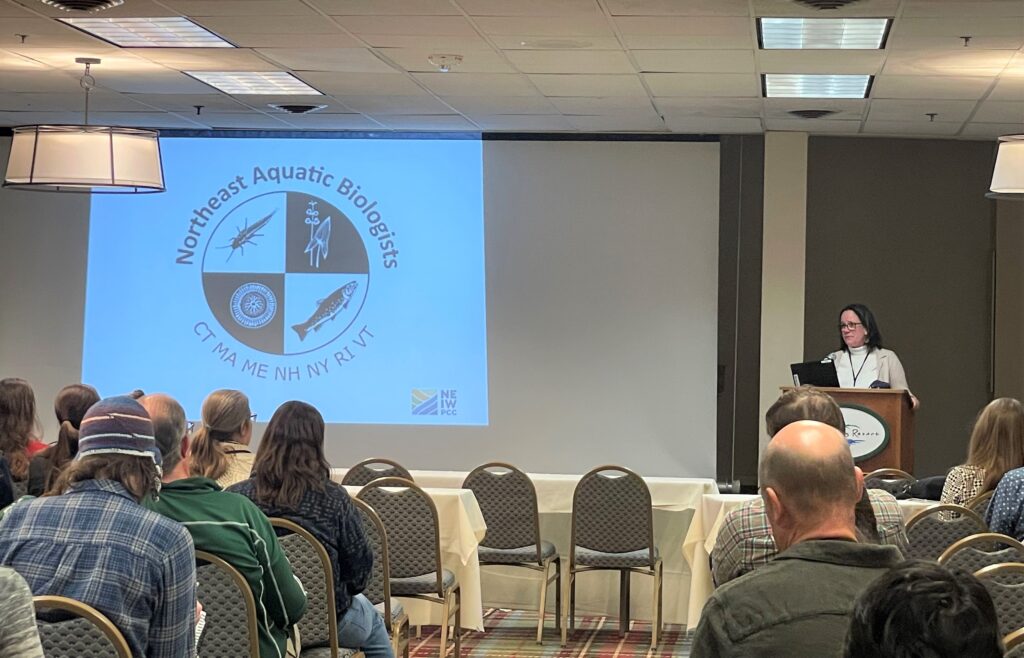More than 175 aquatic and environmental biologists attended the annual Northeast Aquatic Biologists (NAB) Conference in Fairlee, Vermont. The event drew participants from state, federal, tribal, and municipal governments; the private sector; academia; and watershed organizations from New England and New York to network, collaborate, and share research.
Opening remarks were provided NEIWPCC’s Maryann Dugan and Richard Friesner, followed by Heather Pembrook, deputy commissioner of the Vermont Department of Environmental Conservation (VT DEC), and Julie Moore, secretary of the Vermont Agency of Natural Resources. They spoke about the power of collaboration and community across the region’s aquatic biologists.
Kathryn Cottingham, a professor of biological sciences at Dartmouth College, served as the plenary speaker. Cottingham explained how cyanobacteria may help drive eutrophication by changing the availability of phosphorus and nitrogen within the water column.

More than 50 speakers presented on topics such as the impact of climate change on streams, long-term and continuous monitoring, PFAS, macroinvertebrate indices, and environmental justice. NEIWPCC’s post-conference survey showed that the concurrent session on lake monitoring was a crowd favorite. During this session, presenters Kellie Merrell, VT DEC; Jeremy Deeds, Maine Department of Environmental Protection; Mary Becker and Tracy Lizotte, both of Connecticut Department of Energy and Environmental Protection (CT DEEP); and Matthew Kraft, New York State Department of Environmental Conservation, discussed lake bioassessment, monitoring least disturbed lakes, thermocline depth and sustainable lake management.
This year’s event offered two optional pre-conference meetings. The first option, “R Exchange,” provided 26 R coding enthusiasts with an opportunity to share innovative methods and experience leveraging various R programs to streamline unique processes and problems. The second pre-conference meeting option was for state employees throughout the Northeast to connect with staff from the United States Geological Survey (USGS) about the network of streamgages. They discussed the importance of streamgage data and how, through collaboration, the states and USGS can develop a comprehensive regional analysis.
During the annual banquet, the 2024 Legendary Aquatic Biologist Awards were presented to Tracy Lizotte of CT DEEP and Chris Yoder of Midwest Biodiversity Institute. The award honors those who have devoted their careers to furthering science and policy to protect the region’s aquatic resources.
Additional awards were presented to undergraduate, graduate, and Ph.D. students for their presentations. Stefanie Farrington, of the University of Massachusetts (UMass) Amherst, and Kizito Masaba, of Dartmouth College were awarded best oral student presentations. Awards for best student poster presentations were given to Elyse Duff, College of the Holy Cross; Xinchen He, UMass Amherst; Francisco Zafon-Whaler, College of the Holy Cross; and Anna Baynes, UMass Amherst.
The event was coordinated by NEIWPCC in partnership with our member states and the U.S. EPA. The NAB planning team included: Maryann Dugan, Megan Nickerson, Richard Friesner, and Julianna McGovern of NEIWPCC; Heather Pembrook and Kellie Merrell of Vermont Department of Environmental Conservation; Mary Becker of CT DEEP; Tom Danielson and Jeremy Deeds of Maine Department of Environmental Protection; Dahlia Tympanick of Massachusetts Department of Environmental Protection; Dave Neils of New Hampshire Department of Environmental Services; Zach Smith, Alene Onion, and Matthew Kraft of New York State Department of Environmental Conservation; Jane Sawyers of Rhode Island Department of Environmental Management; and Corey Conville of the U.S. EPA.
The 2025 NAB Conference will be held in New Hampshire. The event planners will update the webpage as more information becomes available.